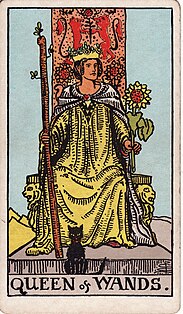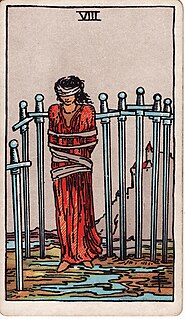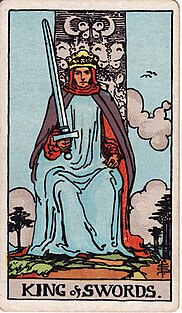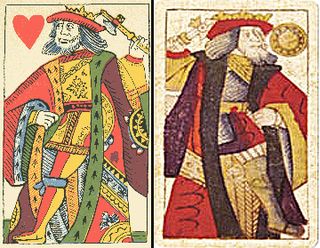Querent may refer to:
- The person who consults a divination process
- Plaintiff, the person initiating a lawsuit
Querent may refer to:

The High Priestess (II) is the second trump or Major Arcana card in most traditional Tarot decks. This card is used in game playing as well as in divination. In the first Tarot pack with inscriptions, the 18th-century woodcut Marseilles Tarot, this figure is crowned with the Papal tiara and labelled La Papesse, the Popess, a possible reference to the legend of Pope Joan.

The Hierophant (V) is the fifth card of the Major Arcana in occult Tarot decks. It is derived from the historical card known as the Pope in playing card decks. It is used in divination.

Geomancy is a method of divination that interprets markings on the ground or the patterns formed by tossed handfuls of soil, rocks, or sand. The most prevalent form of divinatory geomancy involves interpreting a series of 16 figures formed by a randomized process that involves recursion, followed by analyzing them, often augmented with astrological interpretations.

Kau Chim or Kau Cim, also known as Lottery poetry, is a fortune telling practice that originated in China in which the querent requests answers from a sacred oracle lot. The practice is often performed in a Taoist or Buddhist temple in front of an altar. Kau Chim is often referred to as Chien Tung or Chinese Fortune Sticks by westerners. In the US, a version has been sold since 1915 under the name Chi Chi Sticks. Kau Chim is also sometimes known as "The Oracle of Kuan Yin" in Buddhist traditions. It is widely available in Thai temples, known as Siam Si. The similar practice is also found in Japan, named O-mikuji.

Horary astrology is an ancient branch of horoscopic astrology in which an astrologer attempts to answer a question by constructing a horoscope for the exact time at which the question was received and understood by the astrologer.

Electional astrology, also known as event astrology, is a branch found in most traditions of astrology according to which a practitioner decides the most appropriate time for an event based on the astrological auspiciousness of that time. It differs from horary astrology because, while horary astrologers seek to find the answer to a question based on the time the question was asked, electional astrologers seek to find a period of time which will result in the most preferable outcome for an event being planned.

The Lovers (VI) is the sixth trump or Major Arcana card in most traditional Tarot decks. It is used in game playing as well as in divination.

Temperance (XIV) is the fourteenth trump or Major Arcana card in most traditional Tarot decks. It is used in game playing as well as in divination.

The Queen of Wands is a court card in the Minor Arcana set of the Tarot.

Ten of Cups is a Minor Arcana tarot card.

Queen of Cups is a card used in Latin suited playing cards. It is the Queen from the suit of Cups. In Tarot, it is part of what tarot card readers call the "Minor Arcana".

King of Cups is a card used in suited playing cards which include tarot decks. It is part of what esotericists call the Minor Arcana. Tarot cards are used throughout much of Europe to play Tarot card games.

Eight of Swords is a Minor Arcana tarot card. Tarot cards are used throughout much of Europe to play Tarot card games.

The Queen of Swords is a card in the Suit of Swords, part of the Minor Arcana set of the Tarot. Tarot cards are used throughout much of Europe to play tarot card games. In English-speaking countries, Tarot cards are utilized primarily for divinatory purposes.

King of Swords is a card used in Latin suited playing cards which include tarot decks. It is part of what tarot card readers call the "Minor Arcana".

King of Coins is a card used in Latin suited playing cards. It is the King from the suit of Coins. In Tarot, it is part of what tarot card readers call the "Minor Arcana".

The Suit of Coins is one of the four suits used in Latin suited playing cards, such as Spanish, Italian and tarot decks. It corresponds to the Suit of Diamonds in standard decks.

The Suit of Goblets, more often known in modern times as the Suit of Cups, is one of four suits of tarot which, collectively, make up the Minor Arcana. They are sometimes referred to as chalices. Like the other suits of the Minor Arcana, it contains fourteen cards: ace (one), two through ten, page, knight, queen and king. Historically, the suit represented the First Estate. Tarot cards were originally designed for card play and are still used throughout much of Europe to play various Tarot card games. However, in English-speaking countries, where the games are largely unknown, Tarot cards came to be utilized primarily for divinatory purposes. In card games, the equivalent suit is Cups.

Moon blocks or jiaobei, also poe, are wooden divination tools originating from China, which are used in pairs and thrown to seek divine guidance in the form of a yes or no question. They are made out of wood or bamboo and carved into a crescent shape. A pair of clam shells can also be used. Each block is round on one side and flat on the other. It is one of the more commonly used items found in Chinese traditional religion and are used in temples and home shrines along with fortune sticks, both of which are often used together when requesting an answer from the Deities.
User may refer to: